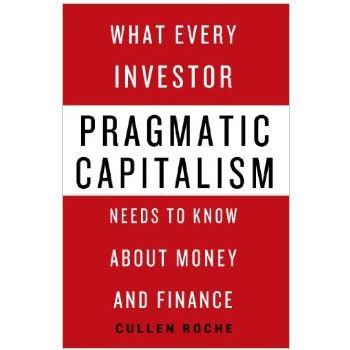I was forwarded a thoughtful and critical review of my book this morning. It’s titled “Cullen Roch’s Not So Pragmatic Capitalism”. While it would be great if everyone just agreed with everything I write it’s actually nice to get pushback so I appreciate this review. I certainly don’t know everything and I am a perennial work in progress so I always try to view criticism as constructive rather than viewing it too negatively. It’s easier to learn that way.
The review doesn’t seem to have any problems with my overall views on investing. But it takes a broad swipe at my economic views. That’s not surprising I guess. My heterodox views are controversial and while I wish they were totally grounded in reality I know there’s a degree of theory and political philosophy involved here. It’s clear that the reviewer is an Austrian advocate so I wanted to respond to a few points.
First, the reviewer states that inflation is an increase in the money supply. That’s fine, but even if it’s true then so what? In a system with endogenous money the money supply is just about always increasing because the population needs more loans to fund future spending and investing. Saying that inflation is an increase in the money supply actually tells us nothing about anything. It just points out an obvious fact of life. It’s like saying that the human population increases with time. Okay. So what. Is that good, bad, what does it mean? We know, for a fact, that more money doesn’t necessarily mean higher prices so what’s the point? What’s the value in saying this?
He goes on to cite the money supply as the monetary base, but this is an obviously flawed measure. If inflation were merely an increase in the monetary base then QE would have created catastrophic inflation. It didn’t and the many Austrian predictions about hyperinflation, predicated on this underlying view, have been explained away with no empirical argument at all.
He goes on to claim:
“an autonomous currency issuer can never effectively reach absolute insolvency, without any specific regard for the nature of money and that which truly ascribes value to it: purchasing power”
This is not at all what I say in the book. In fact, I say that an autonomous currency issuers primary concern should be purchasing power!
He then says:
“Roche fails to recognize that without savings, there can be no consumption or deferment of consumption, the latter of which is entirely forgotten in his work Pragmatic Capitalism. “
This appears to be a misunderstanding of one of the most essential concepts of the book. Savings does not fund aggregate spending. Saving money means someone else is not earning an income. And spending means someone else has an income of which some portion can be saved. The way we fund future spending is not through saving more (in fact, if you save more then aggregate spending will fall, all else being equal). Crucially, it is investment (spending, not consumed for future production) which creates saving. This is a complex point which Austrians continually fail to understand. He goes on to say this is false, but confuses financial assets with non-financial assets which is like talking apples and oranges.
Anyhow, I enjoyed the critique even if I disagreed with it. It’s always nice feedback.
Mr. Roche is the Founder and Chief Investment Officer of Discipline Funds.Discipline Funds is a low fee financial advisory firm with a focus on helping people be more disciplined with their finances.
He is also the author of Pragmatic Capitalism: What Every Investor Needs to Understand About Money and Finance, Understanding the Modern Monetary System and Understanding Modern Portfolio Construction.


Comments are closed.